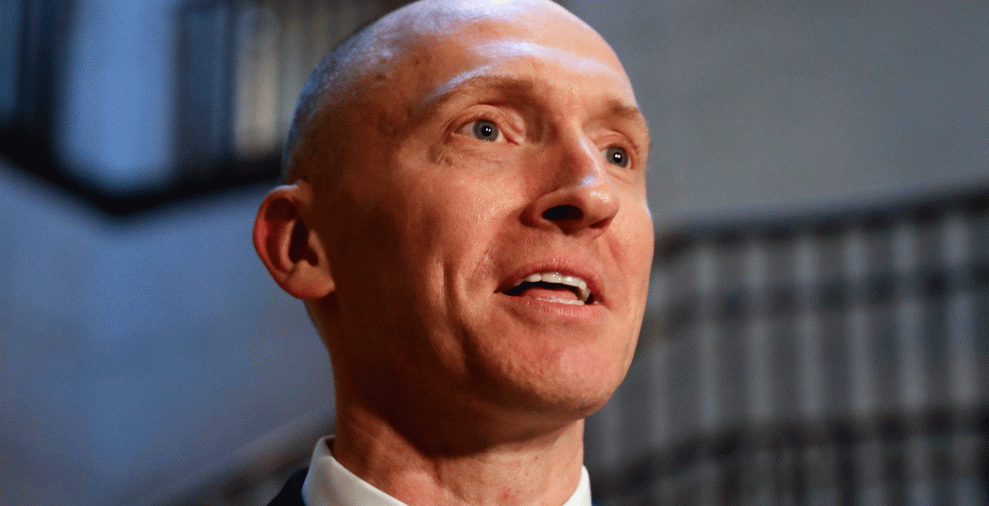
Former Trump campaign advisor Carter PageJ. Scott Applewhite/AP
On Saturday, the Justice Department released previously classified documents on the FBI’s surveillance of Trump campaign adviser Carter Page. The documents, part of a redacted version of the bureau’s 2016 application for a top-secret warrant to surveil Page under the Foreign Intelligence Surveillance Act (FISA), show that the FBI had reason to suspect that Page was the subject of “targeted recruitment” by Russia to influence the outcome of the 2016 election and “has been collaborating and conspiring with the Russian government.” The documents were released after the New York Times, Judicial Watch, and other news and advocacy groups filed Freedom of Information Act lawsuits. This marks the first time a FISA application has been made public since FISA was enacted in 1978.
House Republicans have accused the FBI of abusing its powers to surveil Page. In the February Nunes memo, released by House Intelligence Committee Chairman Devin Nunes (R-Calif.), Republicans on the committee claimed that Page’s surveillance warrant was based on the now-infamous Steele dossier, a report compiled by former British agent Christopher Steele that alleges conspiracy between President Donald Trump and Russia. The documents released Saturday show that the Steele dossier was part, but not all, of the FBI’s warrant application. The application also notes that the FBI believed the person who hired Steele was looking for damaging information on Trump, but added that Steele had historically “provided reliable information” and believed the information “to be credible.”
According to the recently released documents, the FBI told the FISA court that Page “has established relationships with Russian government officials, including Russian intelligence officers” and that the bureau believed that “the Russian government’s efforts are being coordinated with Page and perhaps other individuals associated with” Trump’s campaign.
Page dismissed the contents of the applications on CNN’s State of the Union. “I’ve never been an agent to a foreign power by any stretch of the imagination,” he told host Jake Tapper. “This is really nothing and just an attempt to distract from the real crimes that are shown in this misleading document.”
Trump took to Twitter to claim victory in the “FISA scam.”
Congratulations to @JudicialWatch and @TomFitton on being successful in getting the Carter Page FISA documents. As usual they are ridiculously heavily redacted but confirm with little doubt that the Department of “Justice” and FBI misled the courts. Witch Hunt Rigged, a Scam!
— Donald J. Trump (@realDonaldTrump) July 22, 2018
Looking more & more like the Trump Campaign for President was illegally being spied upon (surveillance) for the political gain of Crooked Hillary Clinton and the DNC. Ask her how that worked out – she did better with Crazy Bernie. Republicans must get tough now. An illegal Scam!
— Donald J. Trump (@realDonaldTrump) July 22, 2018
Trump also claimed that the so-called scam triggered special counsel Robert Mueller’s Russia investigation—it did not—and that the documents provide increasing evidence that his campaign was surveilled “for the political gain of Crooked Hillary Clinton.”
Andrew McCarthy – “I said this could never happen. This is so bad that they should be looking at the judges who signed off on this stuff, not just the people who gave it. It is so bad it screams out at you.” On the whole FISA scam which led to the rigged Mueller Witch Hunt!
— Donald J. Trump (@realDonaldTrump) July 22, 2018
Looking more & more like the Trump Campaign for President was illegally being spied upon (surveillance) for the political gain of Crooked Hillary Clinton and the DNC. Ask her how that worked out – she did better with Crazy Bernie. Republicans must get tough now. An illegal Scam!
— Donald J. Trump (@realDonaldTrump) July 22, 2018
Finally, he assured his followers:
I had a GREAT meeting with Putin and the Fake News used every bit of their energy to try and disparage it. So bad for our country!
— Donald J. Trump (@realDonaldTrump) July 22, 2018
















